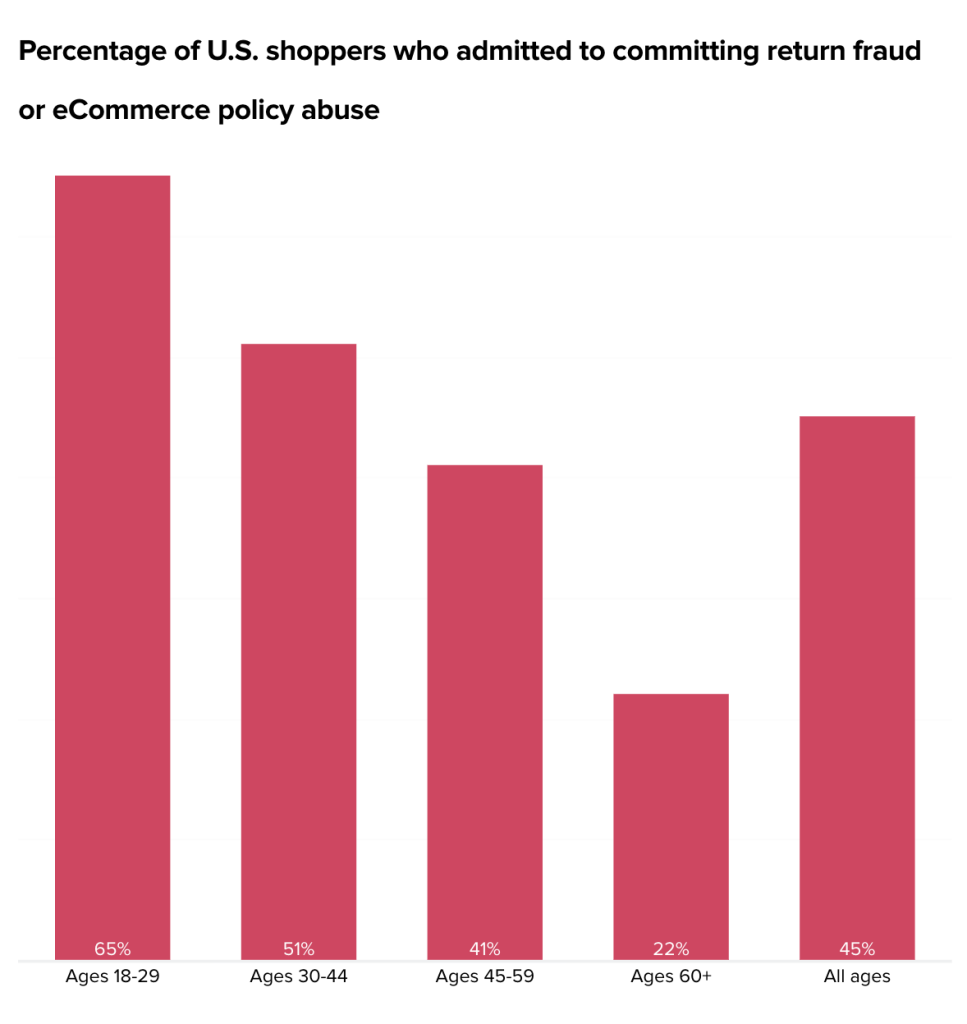We Surveyed 1,000 Consumers About Return Fraud: Here’s What They Said

A new survey reveals that consumers are taking advantage of retailers’ policies to obtain goods through fraudulent returns, wardrobing, coupon fraud, and more.
In early November 2022, Riskified surveyed 1,000 U.S. eCommerce shoppers about their attitudes toward retail return fraud or policy abuse. Consumers answered if they had ever done any of the following actions to exploit a merchant’s goodwill policies:
- Opening a new email address to get more coupons or discount codes
- Claiming an item wasn’t received to get a refund, despite receiving it
- Not sending back an item after receiving a refund for it
- Wearing an item with the tags attached and returning it after use
Here are the key findings from the survey that merchants need to have on their radar.
Nearly half of U.S. shoppers admitted to exploiting merchant policies
45% of the survey respondents have committed some form of “light fraud” (i.e., all categories of return fraud and policy abuse surveyed). But the likelihood of committing policy abuse is inversely correlated with age: the older you are, the less likely you are to have done it.
Percentage of respondents who admitted to committing an action among the surveyed behaviors by age range:
- 65% of those aged 18-29
- 51% of those aged 30-44
- 41% of those aged 45-59
- 22% of those over 60 said yes
One-third of all respondents had opened a new email account to use promotional offers again. This action is also inversely correlated with age. 45% of consumers aged 18-29 said they opened a new email account to get more coupons or discounts, but only 14% of shoppers over 60 said they had done this.

Is return fraud a fraudulent act? The grey area between consumers’ perceptions and merchants’ policies
Many respondents are unaware their actions violate merchant policies. Despite nearly half (45%) of consumers admitting to actions considered forms of return fraud or policy abuse, 61% of consumers say they don’t exploit merchant return or coupon policies.
And only 39% recognize their actions as fraudulent or abusive against a policy (a six percentage point difference).
Less than half (49%) of consumers who exploited merchant policies feel guilty doing so. Over a fourth (27%) justify their actions because they only do it with large retailers, and 14% feel they are “owed” because of a poor customer experience.
Consumers under 30 are the least likely to feel guilty. Only 40% of those who admit to committing return fraud or policy abuse say they feel guilty, compared to 55% for everyone else.
Young adult consumers are also the least likely to recognize specific categories of behavior as a form of return fraud or policy abuse. Only 26% of shoppers under 30 said opening a new email address to get more coupons could be considered an abuse of a merchant’s policies. 46% did not identify “not sending back a package while still getting a refund” as fraudulent.
And 31% of Gen Z and Zennials said they would likely exploit merchant policies again in the future.
Wear and return: Wardrobing represents a significant risk for merchants
Wardrobing—wearing an item with the tag attached and returning it– ranks as the most popular form of return abuse for young adult shoppers. 28% of Gen Z and Zennial respondents have worn an item with the tags attached and returned it. Like the other actions associated with return fraud and policy abuse, wardrobing is also inversely correlated with age. Only 4% of those over 60 have committed wardrobing.
The people most likely to commit wardrobing are in the lowest ($0-$10,000) and the highest income brackets ($200,000 +). Among respondents, 17% of those with low income and 16% of high earners say they’ve worn an item with the tags still attached and returned it (across all age groups).
Women are not more likely than men to commit wardrobing. Men and women are about equally likely to wear an item with the tags attached and then return it, with 14% and 13%, respectively, admitting to it.
More than half of Gen Z and Zennials consumers (54%) did not consider wardrobing an abuse of merchant policies.
“Revenge” is a motivator for consumers to exploit merchant policies
Some shoppers are settling the score with merchants through return fraud, with poor customer service being the top cited reason for abusing retail return policies. 31% of consumers said they are likelier to abuse a merchant’s return policies if they had a bad experience or believed the return policies were unfair.
This finding underscores the challenge that retailers currently face. While they must maintain lenient policies to keep customers happy and build loyalty, they risk the revenue consequences of return fraud.
Interestingly, feeling cash-strapped is not as great a driver of exploitative behaviors. 24% said inflation, having less disposable income, or needing more cash for the holidays would make them more likely to commit policy abuse.
Fight back against return fraud: how merchants can protect their policies from being abused
The survey findings highlight the threat to merchants from unchecked return fraud and policy abuse. Attitudes among younger consumers toward merchants’ policies suggest this problem will only worsen.
“Merchant policy abuse can take many forms—from what customers may perceive as ‘less serious’ activities, like coupon fraud, to falsely claiming they didn’t receive an item. The fact is that these supposedly minor infractions hurt the whole retail ecosystem,” said Eyal Elazar, Policy Abuse Expert at Riskified.
“Our data shows retailers face a growing wave of policy abuse. We see younger shoppers are most likely to commit this type of abuse while simultaneously seeing nothing wrong with their behavior. Merchants would be wise to pay more attention to how policy abuse hurts the bottom line. Leveraging the right solutions can help them guard revenue in an increasingly tough economy.”
It is possible for merchants to confidently balance sales with loss prevention to offer generous policies for loyal customers and block abusers. Discover how by reading the latest IDC spotlight, Policy Abuse: From Fraud Prevention to Profit Enablement.


